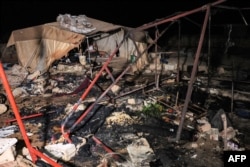United Nations investigators say that human rights violations and abuse in Syria are sowing the seeds for further violence and radicalization, despite diplomatic efforts to stabilize the situation in the country, including through its re-admission to the League of Arab States.
The three-member Independent International Commission of Inquiry on Syria presented this bleak outlook Friday to the U.N. Human Rights Council.
Reacting to the commission assessment, a majority of the 42 countries in the meeting expressed deep concern about continuing alleged crimes against humanity and war crimes by the Syrian regime.
“Nearly 12 years in, the parties to this conflict continue to perpetrate war crimes and to violate basic human rights,” Paulo Pinheiro, commission chair told the council.
“Today, Syrian youth are fleeing the country in droves, leaving behind a fragmented state, a crippled economy and destroyed homes,” he said. “They no long feel they have a future in their own country.”
The U.N. estimates that more than 300,000 civilians have been killed since 2011 and over 12 million forced from their homes—6.8 million within Syria and 5.4 million as refugees in neighboring countries.
During the first half of this year, with the war continuing, “Syrians continued to be killed, disappeared, tortured, arbitrarily detained, displaced and dispossessed,” said Pinheiro, “not only by the state but also by the three other main actors controlling a third of its territory.”
This is reference to the U.N.-designated terrorist group Hayat Tahriri Al-Sham, the opposition Syrian National Army, and the Syrian Democratic Forces in northeastern Syria.
Additionally, the report documents attacks by Syrian forces and five foreign armies still operating in the country, including Russian air forces, Israeli forces, and Turkish-backed militias.
Pinheiro said “escalating unrest and fighting along multiple front lines, a near collapse of the economy, and persistent human rights violations and abuses” make it unsafe for Syrian refugees to return to their country.
The commission said some refugees who have returned to Syria have been detained and ill-treated by Syrian security forces or criminal gangs. It says some have been blackmailed for their release, others have been handed over to security services, and in some cases, people, including children, went missing.
In its report, the investigators criticized the countries’ reluctance to repatriate their nationals being detained in the Al Hawl and Al Rawj camps by the U.S.-backed Kurdish Syrian Democratic Forces.
“Their living conditions amount to cruel and inhuman treatment and outrages on personal dignity for an estimated 50,000 people, mainly women and children,” Pinheiro said.
He said 14 countries have repatriated more than 2,200 foreigners from these camps since the beginning of this year, including more than 1,800 Iraqis.
“Such efforts are absolutely critical,” he said. “We have long stated that the only human rights compliant solution for foreign nationals in the northeast is repatriations.”
Syria’s ambassador to the U.N. in Geneva, Haydar Ali Ahmad, rejected the commission’s report as biased and replete with contradictory and false information “which was shameful from a professional perspective.”
He described the commission as “a mere tool of incitement against the Syrian Government” and called for the withdrawal “of the occupying American and Turkish forces” as the only way to improve the situation.
He said this would “allow the return of refugees and internally displaced persons, and the lifting of all illegally imposed unilateral coercive measures on the country.”


